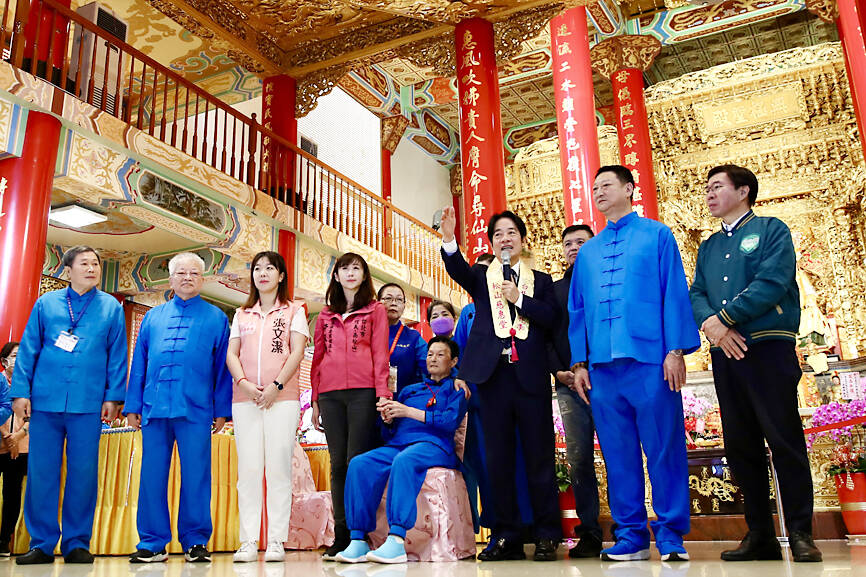Taiwan must not revert back to reliance on China’s economy, Vice President William Lai (賴清德) said yesterday, adding that opening to more Chinese students and workers as advocated by the opposition could lead to difficult conditions for young Taiwanese.
The Democratic Progressive Party (DPP) presidential candidate elaborated on his economic platform while visiting two Matsu temples and a local market in Taipei’s Songshan District (松山) yesterday morning.
Boosting the economy involves not just developing science and technology sectors, but also its medium, small and microenterprises, Lai said.

Photo: Ritchie B. Tongo, EPA-EFE
“In traditional markets, we like to see all vendors have active businesses to make a living, then our society can strive forward,” he said. “It is my job to take care of everyone, to help their livelihood.”
“Our government has approved free tuition for highschools and vocational schools starting next year, as well as tuition and school expense subsidies for students at private colleges,” Lai said.
“When our citizens pursue their goals, our nation can make progress,” he added.
Lai asked local residents and market vendors if they want the government to restart the Cross-Strait Service Trade Agreement (CSSTA) talks with China, which the presidential candidates of the Chinese Nationalist Party (KMT) and the Taiwan People’s Party have said they favor.
“If they sign the agreement, then [Chinese citizens] can come here and open chicken rice restaurants,” he said, pointing to a nearby restaurant sign.
“There are correct ways to boost our economy and stimulate growth. It is wrong to go backward and regress onto past roads. It is the wrong policy to push for economic growth by locking Taiwan up to only depend on China’s economy,” he said.
He also quoted the KMT’s presidential candidate, New Taipei City Mayor Hou You-yi (侯友宜), who said that he supports welcoming more Chinese university students, who could take jobs in Taiwan after graduating.
“If Chinese students come to Taiwan in large numbers, what would Taiwan’s young people be left with?” Lai added.
Experts say that China is facing an economic crisis, and its youth jobless rate was at 20 percent in June before Beijing stopped releasing figures, with some observers saying it has likely now reached 40 percent, he said.
Afterward, Lai headed south to Nanshan Fude Temple in New Taipei City’s Jhonghe District (中和) to stump for DPP legislative candidate Justin Wu (吳崢), who was a student leader in the 2014 Sunflower movement.
“Justin was an activist in his university days. He joined in the occupation of the legislature when protests began in March 2014,” Lai said.
“Students and young people at the time were fighting against the KMT’s forcing through of the CSSTA in the legislature without proper deliberation procedures,” he said.
“It was young people and student activists, Wu among them, who successfully blocked the KMT’s cross-strait economic deal. They were the ones who safeguarded Taiwan’s healthy economic development,” he added.

An essay competition jointly organized by a local writing society and a publisher affiliated with the Chinese Communist Party (CCP) might have contravened the Act Governing Relations Between the People of the Taiwan Area and the Mainland Area (臺灣地區與大陸地區人民關係條例), the Mainland Affairs Council (MAC) said on Thursday. “In this case, the partner organization is clearly an agency under the CCP’s Fujian Provincial Committee,” MAC Deputy Minister and spokesperson Liang Wen-chieh (梁文傑) said at a news briefing in Taipei. “It also involves bringing Taiwanese students to China with all-expenses-paid arrangements to attend award ceremonies and camps,” Liang said. Those two “characteristics” are typically sufficient

A magnitude 5.9 earthquake that struck about 33km off the coast of Hualien City was the "main shock" in a series of quakes in the area, with aftershocks expected over the next three days, the Central Weather Administration (CWA) said yesterday. Prior to the magnitude 5.9 quake shaking most of Taiwan at 6:53pm yesterday, six other earthquakes stronger than a magnitude of 4, starting with a magnitude 5.5 quake at 6:09pm, occurred in the area. CWA Seismological Center Director Wu Chien-fu (吳健富) confirmed that the quakes were all part of the same series and that the magnitude 5.5 temblor was

The brilliant blue waters, thick foliage and bucolic atmosphere on this seemingly idyllic archipelago deep in the Pacific Ocean belie the key role it now plays in a titanic geopolitical struggle. Palau is again on the front line as China, and the US and its allies prepare their forces in an intensifying contest for control over the Asia-Pacific region. The democratic nation of just 17,000 people hosts US-controlled airstrips and soon-to-be-completed radar installations that the US military describes as “critical” to monitoring vast swathes of water and airspace. It is also a key piece of the second island chain, a string of

The Central Weather Administration has issued a heat alert for southeastern Taiwan, warning of temperatures as high as 36°C today, while alerting some coastal areas of strong winds later in the day. Kaohsiung’s Neimen District (內門) and Pingtung County’s Neipu Township (內埔) are under an orange heat alert, which warns of temperatures as high as 36°C for three consecutive days, the CWA said, citing southwest winds. The heat would also extend to Tainan’s Nansi (楠西) and Yujing (玉井) districts, as well as Pingtung’s Gaoshu (高樹), Yanpu (鹽埔) and Majia (瑪家) townships, it said, forecasting highs of up to 36°C in those areas